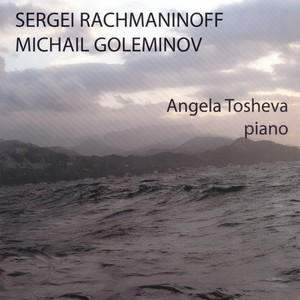
Sergei Rachmaninoff, Michail Goleminov - piano works
- 歌唱: Angela Tosheva
- 发行时间:2007-01-01
- 类型:录音室专辑
- 歌曲
- 时长
-
作曲家:Sergei Rachmaninoff
-
作品集:Prelude
-
作曲家:Sergei Rachmaninoff
-
作品集:Prelude
-
作曲家:Sergei Rachmaninoff
-
作品集:Prelude
-
作曲家:Sergei Rachmaninoff
-
作曲家:Michail Goleminov
-
作曲家:Sergei Rachmaninoff
-
作品集:Prelude
简介
The goodwill of dear friends wishing to stay anonymous sponsored the studio record of my concert tour on which I played the Rachmaninoff Preludes and pieces by Michail Goleminov, as well as the thoroughly new grand piano „Steinway” from July 2004 at the big stage of the Bulgaria Hall in Sofia. This encouraged me to persist in my journey through the Russian classical music after Scriabine. The preceding compact disc recorded in 2002 and published in 2004, combined etudes by Scriabine, Debussy and Ligeti, now Rahmaninoff and Michail Goleminov are together in this one. Two different worlds, building bridges between each other. My intention to present the piano masterpieces by Rahmaninoff through the viewpoint of a man from a different age is in accord with my late rediscovery of Rachmaninov – even after Xenakis, Ligeti, Lazar Nikolov, Kurtag, Symanzski, Ton de Leuw, Viviez. This opened new horizons, far distinguished from the stereotype performance cliches and mawkish idea of Rahmaninoff piano style – for a more rigorous search of the original source and emphasis on Rachmananinoff’s relentlessly exquisite, subtle fine taste. The closeness of the two composers is a natural result of my genuine involvement in searching for the pure kernel sound in the work performed. Settled with the Rachmaninoff Preludes, the music of Michail Goleminov actively creates the cherished modern conception of them. And vice versa, Rachmaninoff’s Preludes visualize the hidden romanticism of Goleminov, in spite of the fact that both “Floating Metal” and “Music Of the Ice Melting” arise from the ideal for a genuine piano sound – a sound with no self-indulging obliqueness, which ranges from diversely tinged dynamic nuances to metallic sound flashes. The kernel of ascetic sound, which is the true starting point of Goleminov, being developed closely and gradually with extreme economy at the verge of laconism, at a certain moment accumulates its own dramatic and emotional tension revealing the lonely figure of a neoromantic artist. The threads of the drama are hidden deep under the layers of motionless and scarcely vibrant enlightened mass of sound, instantaneously crashing into an apocalyptic stroke and then again are set in order, but never the same anymore. Rachmaninoff’s Preludes: it is very difficult to formulate their uniqueness because of its multidimensional and specific character. Strange how the art of a man from nineteenth century has been continuously tempting up to this very day for audience having experienced so diverse forms of progress, novelties, transformations and an active movement in the direction of what is modern. Rachmaninoff provokes us to think over the relative quality and imprecision of terms such as fashion, taste, style, temporariness, sound. Obviously the chronological approach towards the hierarchies of values in music could not help us in this case – the reason is perhaps in the generally accepted position that the old is old and the new is modern and original. The magnificent universes of sound by Sergei Rachmaninoff decisively refute such a position. Very specifically and uniquely his piano style focuses on seemingly incompatible things – a clear and linear Bach type of constructiveness, the broadly tolerated by the Russian academical complexity of the texture, close to the folklore chanting, blending of Slavonic temperament with impressionistic exquisiteness and transparency, infinite courage in extending the piano sound, extreme amplitude of expression and dynamics. This, of course, would not have been possible, were it not for his experience as a genius performing pianist. In this sense Rachmaninoff is a representative of a vanishing tradition in classical music – he is the culminating point of the phenomena composer-performer. With very few exceptions, the ways of composers and instrumentalists from recent ages have got separated: the composers tending to create in laboratory conditions works that are not so adaptable to perform, while the instrumentalists have taken the path of reproducing – often virtuous and attractive – but deprived from the quality of the creative impetus. The fact is, that Rachmaninoff is not very often performed at standard concerts: for the moderate minded people he is too unrestrained, for the connoisseurs of the speculative West European music culture – he is too spontaneous, for the modern music listeners – he is too old-fashioned. It is sure that the music of Rachmaninoff is not appropriate for faint-hearted interpreters, i.e., to those unable to truly love music. If the concept of love from first glance really exists, the Preludes of Rachmaninoff are its sonoric embodiment.







